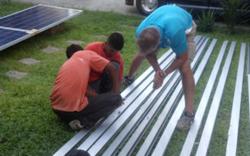Ambassador Energy develops relationships in Philippines
 Ambassador Energy has partnered with a group from the Philippines to build a new solar company poised for fast growth in the island nation.
Ambassador Energy has partnered with a group from the Philippines to build a new solar company poised for fast growth in the island nation.
Ambassador, based in Southern California, has been in the solar business since 2007. It’s not the typical international solar developer. The company does three things, said president Kelly Smith. It’s Ambassador Energy College offers training and certification to contractors in other fields who want to make the switch to solar. The company also does its own development and installations up and down the state of California. And it partners with contracting firms that want to make solar part of their brands.
“We sort of get married and provide all of the brain trust,” Smith said. “We become their go-to with quoting and system organization.”
They build the bones of a solar business for existing companies that want to adopt it and provide ongoing support. It’s a lot like the ready-made business someone might get if they were buying a franchise.
“But there’s so much control in a franchising,” Smith said. “All of the contractors we work with are well-established businesses that wouldn’t want to change their brands.”
A group of contractors – some who live in U.S. and some in the Philippines – approached Ambassador last year about building a solar energy company there.
“We designed a system and shipped it out there using their logistics,” Smith said.
The group has its logistics dialed in and ready for large scale solar development. The timing couldn’t be better. The Philippines recently announced a new incentive for solar. “We didn’t even know about it until we were on the plane headed home,” Smith said.
The Philippines looked like a promising location for a solar business even before Ambassador Energy and its Filipino partners knew there would be a subsidy because energy costs are extraordinarily high. “It’s an island,” Smith said. “It’s always a challenge to get affordable energy to an island.”
There also isn’t a lot of competition from other solar developers on the island. And the new subsidy isn’t likely to attract them in droves either as the deadline to qualify is Feb. 28 and the companies who can qualify have to have previously installed in the country.
But Smith said she expects the rebate to be $2 a watt, which will be significant. It reflects the country’s support for solar, which could do the industry a lot of good. “There’s a lot of political enthusiasm for what they’re saying could be millions of houses,” Smith said. It looks like California did in 2006.”



